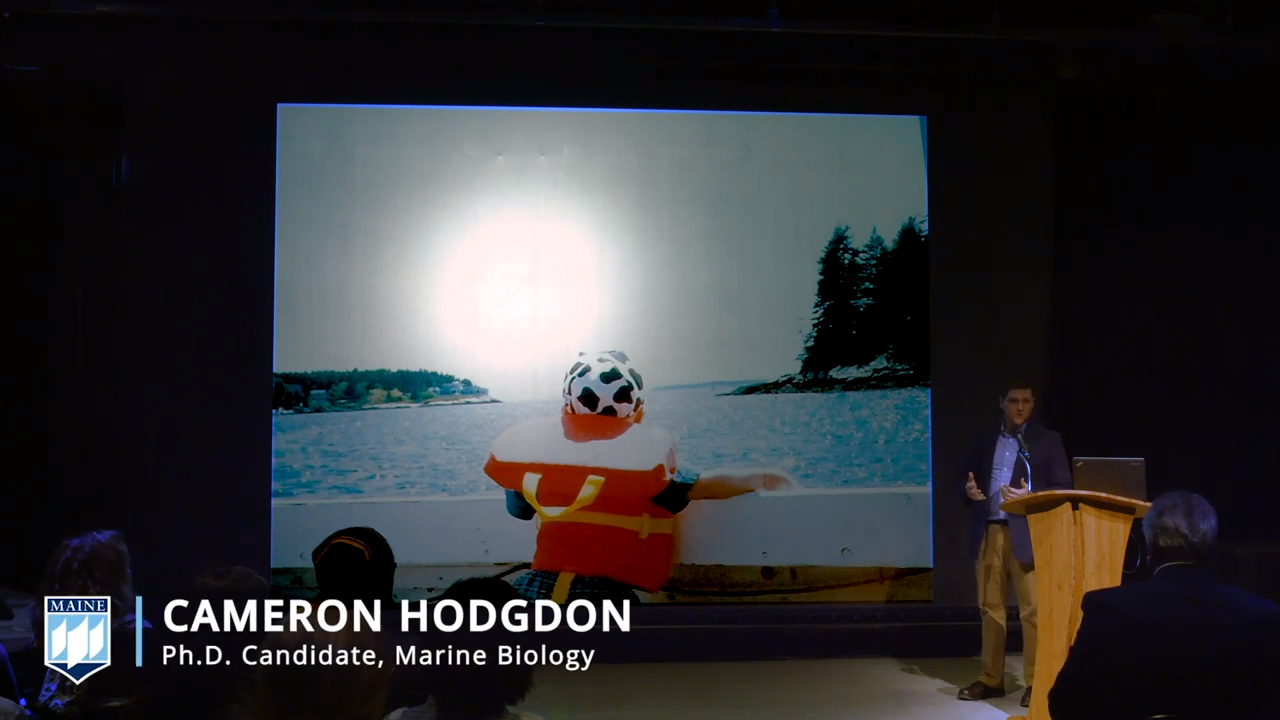
Graduate students wow the crowd with 3MT presentations
“An 80,000 word Ph.D. thesis would take 9 hours to present. Their time limit… 3 minutes.”
Graduate students at the University of Maine competed in the annual Three Minute Thesis (3MT) event on March 25. Participants follow guidelines set by the University of Queensland, the founders of the competition.
The rules are simple: present research in non-technical language to a general audience with only a static visual slide to accompany the speech.
A total of 11 competitors performed their 3MT presentations on stage at the IMRC in Orono. Judges included James Beaupre, director, University of Maine Department of Industrial Cooperation; Veena Dinesh, director of Business Incubation, University of Maine Foster Center for Student Innovation; and Elena Metzger, owner of Print Bangor.
The three finalists will perform their presentations at the upcoming UMaine Student Symposium on April 10 at the Cross Insurance Center in Bangor. They are:
• First Place – Cameron Hodgdon, doctoral candidate in Marine Biology, “Incorporating environmental drivers to improve assessment & projections for American lobster in a changing Gulf of Maine & Southern New England”
• Second Place – Atefeh Rajaei, doctoral candidate in Biochemistry and Molecular Biology, “Alternative ways of combatting bacterial infections”
• Third Place – Charitha Perera, doctoral candidate in Chemistry, “Artificial photosynthesis: Turning water into Hydrogen (H2) fuel using sunlight”
Hodgdon’s winning presentation will represent UMaine at the annual Northeastern Association of Graduate Schools regional 3MT competition happening April 11 – 13 in Philadelphia.
“The Three Minute Thesis competition makes you think differently about your research than you ever have,” says Hodgdon. “Too many of us simply see our research as numbers and equations and models and charts, but it’s more than that: it’s an impact. This competition forces you to explore that. Creating a Three Minute Thesis presentation forces you to think critically about your research: not just what you are doing, but why you are doing it. When it’s all over, you feel more prepared for communicating your research effectively, especially to those who may have seemed disinterested before.”
The 2019 UMaine 3MT presentations were recorded and can be found online.
Naomi Rose Caywood, M.A. Candidate in Global Policy, “The effects of multi-aged enrollment on community school literacy rates in rural Zambia: Case study on Impact Network International schools, Eastern Province Zambia”
Hsiao-Yun Chang, Ph.D. Candidate in Marine Biology, “Northern shrimp reproductive potential in a changing Gulf of Maine”
Jonathan Gendron, M.S. Candidate in Economics, “Maine’s forestry and logging industry: Finding a pathway for economic success”
Cameron Hodgdon, Ph.D. Candidate in Marine Biology, “Incorporating environmental drivers to improve assessment & projections for American lobster in a changing Gulf of Maine & Southern New England”
Sarah Paluso, M.S. Candidate in Animal Science, “Alternative treatments in sheep and goat disease”
D.Charitha Perera, Ph.D. Candidate in Chemistry, “Artificial photosynthesis: Turning water into Hydrogen (H2) fuel using sunlight”
Trevor Peterson, Ph.D. Candidate in Ecology and Environmental Science, “Bats and wind: Balancing risk and renewable energy”
Atefeh Rajaei, Ph.D. Candidate in Biochemistry and Molecular Biology, “Alternative ways of combatting bacterial infections”
Jesse Walters, Ph.D. Candidate in Earth Sciences, “Quantifying the missing link in the global Sulfur cycle”
Michael Wilczek, Ph.D. Candidate in Microbiology, “Deciphering the perpetual fight between virus and host: Understanding a patient but almost unfailing, deadly virus”
Luoliang Xu, Ph.D. Candidate in Ecology and Environmental Science, “Using computer simulation to test the fishery management regulation”
*This UMaine 3MT is co-sponsored by the University of Maine Graduate School and the Foster Center for Student Innovation.
Media Contact: Christel Peters, 207.581.3571

